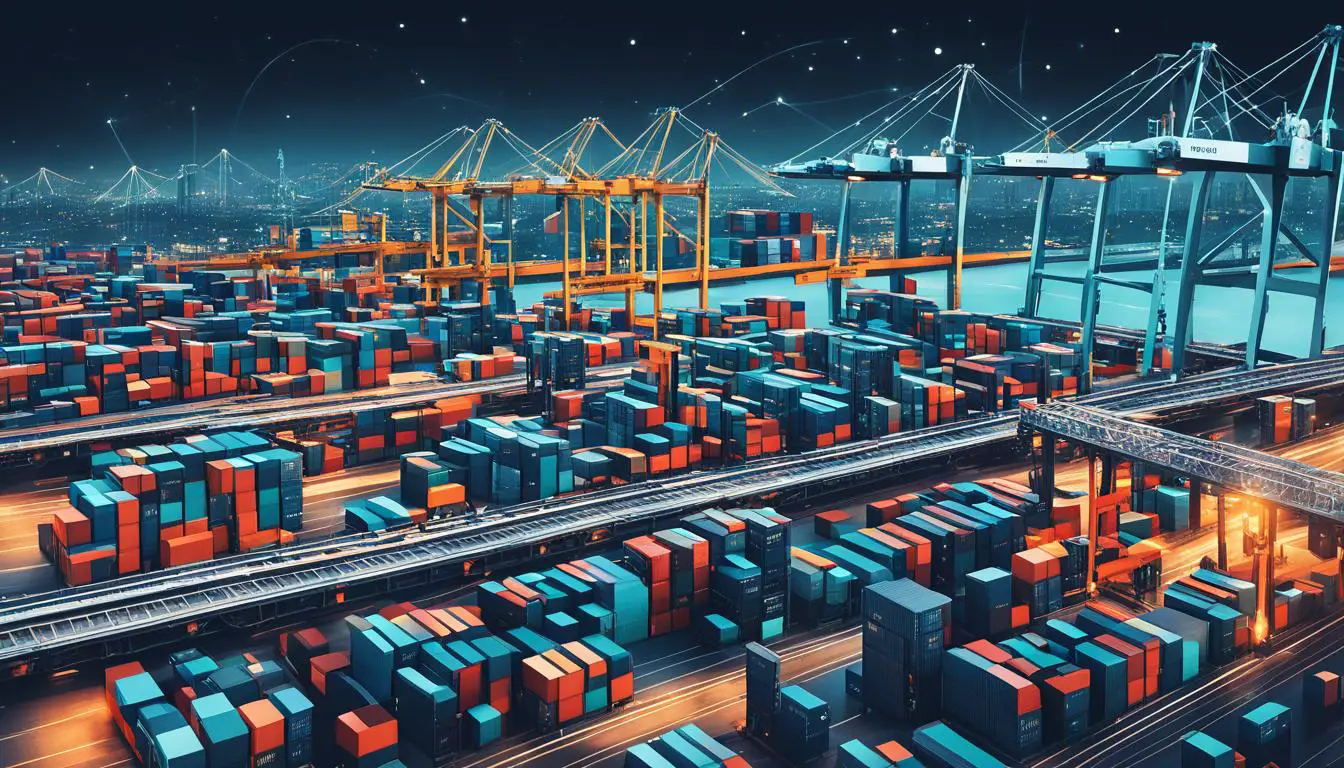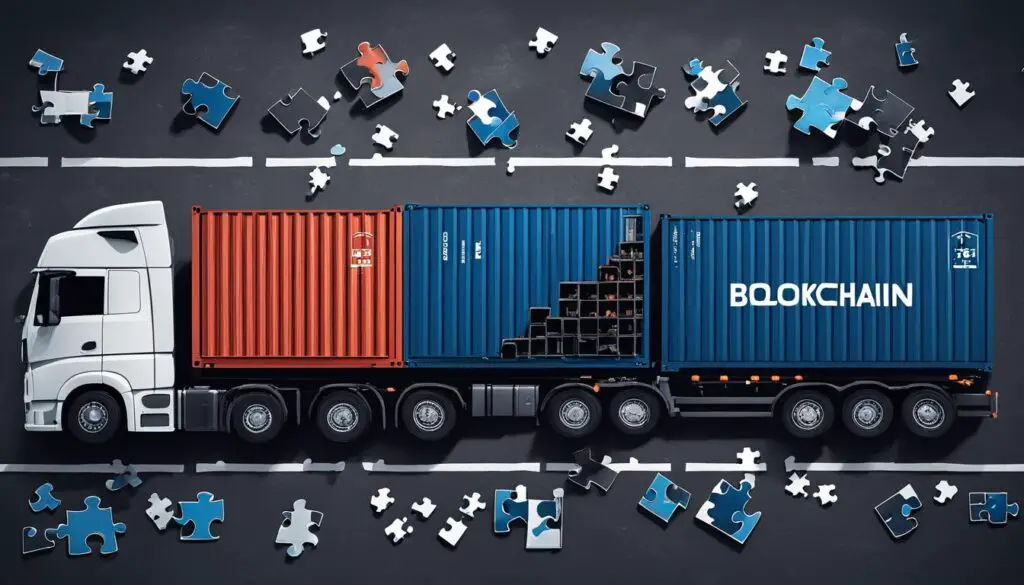
Blockchain in Transportation: Reshaping Logistics
The transportation logistics industry is undergoing a transformation with the advent of blockchain technology. As organizations strive for greater autonomy in their operations, blockchain offers a solution to modernize legacy software applications and integrate intelligent AI and GenAI features. The role of blockchain in logistics is crucial, as it enhances security and efficiency, revolutionizing the way goods are transported and managed.
The adoption of blockchain technology in logistics comes at a time when AI is set to transform organizational culture, augmenting the workforce in the Asia-Pacific region by 2025. Organizations are embracing intelligent enterprise applications, creating a paradigm shift towards human-machine collaboration and envisioning autonomous organizations in the near future.
Key Takeaways:
- Blockchain technology is reshaping the logistics industry through enhanced security and efficiency.
- AI will augment the workforce in the Asia-Pacific region, enabling intelligent enterprise applications.
- The role of blockchain in logistics is crucial for modernizing legacy software applications.
- Organizations are adopting blockchain to create autonomous organizations and optimize operations.
- The future of blockchain in transportation logistics holds promise with the formation of consortia and integration with IoT and data analytics.
The Benefits of Blockchain in Transportation
Blockchain technology has revolutionized the transportation logistics industry, bringing with it a myriad of benefits. Let’s explore how blockchain enhances security, improves efficiency, and enables transparency in the supply chain.
Enhanced Security and Transparency
One of the key advantages of blockchain in transportation is enhanced security. With its immutable and transparent ledger, blockchain reduces the risk of fraud and tampering, providing a robust and trustworthy system for recording transactions. This increased security instills confidence among stakeholders and helps maintain the integrity of the supply chain.
“Blockchain technology ensures secure and tamper-resistant transactions, creating a more transparent and trustworthy logistics ecosystem.”
Additionally, blockchain enables transparency in the supply chain by capturing and storing data in a decentralized manner. This transparency ensures that all participants have access to reliable and real-time information, improving collaboration and reducing disputes. Through blockchain’s transparency, organizations can track the movement of goods throughout the entire supply chain, from production to delivery, promoting accountability and traceability.
Efficiency and Streamlined Processes
Blockchain technology streamlines documentation processes in transportation logistics, reducing paperwork and eliminating manual errors. By digitizing and automating these processes, organizations can save time and resources, enabling operational efficiency. Moreover, the use of smart contracts in blockchain facilitates automated and secure transactions, removing the need for intermediaries and reducing transaction costs.
Real-time tracking of goods is another significant advantage of blockchain in transportation. Through blockchain-enabled platforms, organizations can monitor the movement and location of goods at every stage of the supply chain, providing visibility and insights that were previously unavailable. This real-time tracking improves inventory management, reduces delays, and allows for proactive decision-making to optimize logistics operations.
A Visual Representation of the Benefits of Blockchain in Transportation
| Benefits | Description | Impact |
|---|---|---|
| Enhanced Security | Immutable and transparent ledger reduces fraud and tampering. | Increased trust and integrity in the supply chain. |
| Improved Efficiency | Streamlined documentation processes and automated transactions. | Time and cost savings, enhanced operational efficiency. |
| Transparency in Supply Chain | Real-time tracking and decentralized data capture. | Improved visibility, accountability, and traceability. |
Note: This table provides a visual representation of the benefits of blockchain in transportation, illustrating how it enhances security, improves efficiency, and enables transparency in the supply chain.
Blockchain technology offers immense potential in reshaping the transportation logistics industry. With its enhanced security measures, improved efficiency, and transparency in the supply chain, blockchain is revolutionizing the way goods are transported and managed. Through the combination of secure transactions, streamlined processes, and real-time tracking, organizations can optimize their logistics operations and create a more integrated and seamless logistics ecosystem.
Use Cases of Blockchain in Transportation
Blockchain technology is revolutionizing the transportation logistics industry with its wide range of applications. Let’s explore some of the key use cases of blockchain in transportation:
1. Supply Chain Management
In the realm of supply chain management, blockchain brings unprecedented transparency and traceability to the movement of goods. By leveraging blockchain technology, companies can establish end-to-end visibility into their supply chains, mitigating the risk of counterfeiting and ensuring ethical sourcing. This enhanced transparency fosters greater trust among stakeholders, ultimately leading to more efficient and secure supply chain operations.
2. Freight Tracking
Freight tracking is another area where blockchain is making a significant impact. By employing blockchain-based solutions, companies can monitor shipments in real-time, allowing for precise tracking and tracing throughout the transportation journey. This real-time visibility not only enhances operational efficiency but also reduces the risk of lost or stolen goods, safeguarding valuable assets and minimizing supply chain disruptions.
3. Smart Contracts
Smart contracts are automated, self-executing contracts that run on blockchain technology. In the context of transportation logistics, smart contracts streamline payment and settlement processes, minimizing errors and eliminating the need for intermediaries. By automating these processes, smart contracts enhance efficiency and increase trust among stakeholders, while reducing costs and improving overall operational accuracy.
In summary, blockchain technology offers compelling use cases in transportation logistics, ranging from supply chain management and freight tracking to the automation of payment processes through smart contracts. Harnessing the power of blockchain in these areas enables organizations to achieve enhanced transparency, increased efficiency, and improved trust among stakeholders.
| Use Case | Benefits |
|---|---|
| Supply Chain Management | – End-to-end transparency – Reduced risk of counterfeiting – Ethical sourcing assurance |
| Freight Tracking | – Real-time monitoring – Reduced risk of lost or stolen goods – Improved operational efficiency |
| Smart Contracts | – Automated payments and settlements – Minimized errors and intermediaries – Increased trust among stakeholders |

Challenges and Concerns of Implementing Blockchain in Transportation
While blockchain technology holds tremendous potential for the transportation logistics industry, its implementation is not without challenges and concerns. Addressing these obstacles is crucial to realizing the full benefits of blockchain in transportation.
Scalability
One of the primary challenges faced in implementing blockchain in transportation is scalability. As the volume of transactions increases, blockchain networks need to handle a large number of real-time transactions efficiently. The current scalability limitations of blockchain technology pose a significant hurdle for widespread adoption in the transportation industry.
Interoperability
Interoperability is another critical concern when implementing blockchain in transportation. The industry comprises various blockchain platforms and existing legacy systems that need to seamlessly communicate and share data. Achieving interoperability between these different technologies is vital for enabling a unified and efficient logistics ecosystem.
Regulatory Compliance
Regulatory compliance is a significant concern for organizations adopting blockchain in transportation. The legal and regulatory frameworks surrounding blockchain technology in the logistics industry are still evolving. Navigating compliance requirements while leveraging the benefits of blockchain presents a complex challenge for transportation logistics providers.
“Scalability, interoperability, and regulatory compliance are the key challenges organizations face when implementing blockchain in transportation logistics.”
To overcome these challenges, the industry must invest in research and development to enhance the scalability of blockchain networks. Furthermore, collaboration among stakeholders is essential to establish standards and protocols for interoperability between different blockchain platforms and legacy systems. Finally, policymakers and regulators must work closely with industry players to establish clear and comprehensive frameworks that enable regulatory compliance while fostering innovation.
| Challenges of Implementing Blockchain in Transportation | Solutions |
|---|---|
| Scalability | Invest in research and development to enhance blockchain scalability. |
| Interoperability | Promote collaboration among stakeholders to establish standards for interoperability. |
| Regulatory Compliance | Work closely with policymakers and regulators to develop clear frameworks for compliance. |
By addressing these challenges, the transportation logistics industry can unlock the full potential of blockchain technology and reap its benefits, such as enhanced security, improved efficiency, and increased transparency in supply chain management.

With a clear understanding of the challenges and a concerted effort to find solutions, the transportation logistics industry can overcome these obstacles and harness the transformative power of blockchain technology.
Future Trends of Blockchain in Transportation Logistics
The future of blockchain in transportation logistics holds immense promise as the industry continues to evolve. Several key trends are emerging, shaping the future landscape of blockchain implementation in logistics.
Formation of Blockchain Consortia
One prominent trend is the formation of blockchain consortia, where multiple organizations come together to collaborate on blockchain implementation. By joining forces, these consortia aim to create shared benefits and establish industry-wide standards for blockchain adoption in transportation logistics. This collaborative approach fosters innovation, accelerates implementation, and ensures interoperability across various stakeholders, ultimately driving the industry forward.
Integration of Blockchain with the Internet of Things (IoT)
Another significant trend is the integration of blockchain with the Internet of Things (IoT). This integration enables seamless tracking and monitoring of goods throughout the supply chain, enhancing transparency, and improving logistics operations. By combining the power of blockchain’s immutable ledger with the real-time data and connectivity of IoT devices, organizations can achieve greater visibility, traceability, and security in their transportation logistics processes.
Data Analytics Powered by Blockchain
Data analytics will play a crucial role in the future of blockchain in transportation logistics. Blockchain’s decentralized nature and secure data storage capabilities provide a solid foundation for harnessing the power of analytics. By leveraging blockchain technology, organizations can gather vast amounts of data from various sources, including IoT devices, and analyze it to gain valuable insights. These insights can be used to optimize operations, predict demand, and improve overall efficiency in transportation logistics.
As we look ahead, it is clear that blockchain will continue to reshape the transportation logistics industry. The formation of blockchain consortia, integration with IoT, and the utilization of data analytics will drive innovation, enhance efficiency, and unlock new opportunities for the industry. Embracing these future trends will pave the way for a more connected, secure, and efficient transportation logistics ecosystem.
Case Study: Blockchain in Supply Chain Management
One notable case study of blockchain in supply chain management is the partnership between IBM and Maersk. The companies developed a blockchain platform called TradeLens, which provides end-to-end visibility and transparency for global shipping.
By digitizing and encrypting supply chain data on a blockchain, TradeLens reduces paperwork, eliminates manual errors, and enhances trust among stakeholders. This case study demonstrates the potential of blockchain in revolutionizing supply chain management and improving overall logistics efficiency.
| Benefits | TradeLens Features |
|---|---|
| Enhanced Transparency | Real-time visibility of supply chain data |
| Reduced Risks | Digitized and encrypted data for secure transactions |
Conclusion
Blockchain technology is revolutionizing the transportation logistics industry, playing a pivotal role in reshaping the future of logistics. Its benefits, such as enhanced security, improved efficiency, and transparency in supply chain management, are transforming the way goods are transported and managed.
As organizations continue to embrace blockchain, we can expect future trends to further optimize logistics operations. The formation of blockchain consortia will foster collaboration among multiple organizations, creating shared benefits and standards. Additionally, the integration of blockchain with the Internet of Things (IoT) will enable seamless tracking and monitoring of goods throughout the supply chain, ensuring better visibility and control.
Blockchain-powered data analytics will also play a crucial role in the future of transportation logistics. By leveraging the wealth of information stored on the blockchain, organizations will gain valuable insights for optimizing operations, predicting demand, and improving overall efficiency.
Despite the challenges and concerns that exist, the potential benefits of blockchain in transportation logistics make it a valuable technology. With its ability to enhance security, improve efficiency, and enable transparency, blockchain is driving the industry towards a more integrated and seamless logistics ecosystem. The future of logistics is being shaped by blockchain, and its impact will continue to revolutionize the way goods are transported and managed.
FAQ
How does blockchain technology enhance security in transportation logistics?
Blockchain provides an immutable and transparent ledger, reducing the risk of fraud and tampering. It also enables automated and secure transactions through smart contracts, eliminating the need for intermediaries.
What are the benefits of blockchain in transportation logistics?
Blockchain enhances security, improves efficiency, and enables transparency in supply chain management. It reduces paperwork, streamlines documentation processes, and enables real-time tracking of goods throughout the supply chain.
What are the use cases of blockchain in transportation logistics?
Blockchain is used in supply chain management to ensure end-to-end transparency and traceability of goods, and in freight tracking to enable real-time monitoring of shipments. Smart contracts are also utilized for automating payment and settlement processes.
What are the challenges of implementing blockchain in transportation logistics?
Scalability, interoperability, and regulatory compliance are the main challenges faced when implementing blockchain in transportation logistics. Blockchain networks must handle a large volume of transactions, need to integrate with existing systems, and comply with evolving legal and regulatory frameworks.
What are the future trends of blockchain in transportation logistics?
The future trends include the formation of blockchain consortia for collaborative implementation, integration with the Internet of Things (IoT) for seamless tracking and monitoring, and the use of data analytics to optimize operations.
Can you provide a case study of blockchain in supply chain management?
One notable case study is the partnership between IBM and Maersk, which developed the TradeLens blockchain platform. TradeLens allows for end-to-end visibility and transparency in global shipping, reducing paperwork, eliminating manual errors, and enhancing trust among stakeholders.
What is the role of blockchain in reshaping the logistics industry?
Blockchain technology is revolutionizing the transportation logistics industry by enhancing security, improving efficiency, and enabling transparency in supply chain management. It is reshaping the industry by modernizing processes and paving the way for a more integrated and seamless logistics ecosystem.
